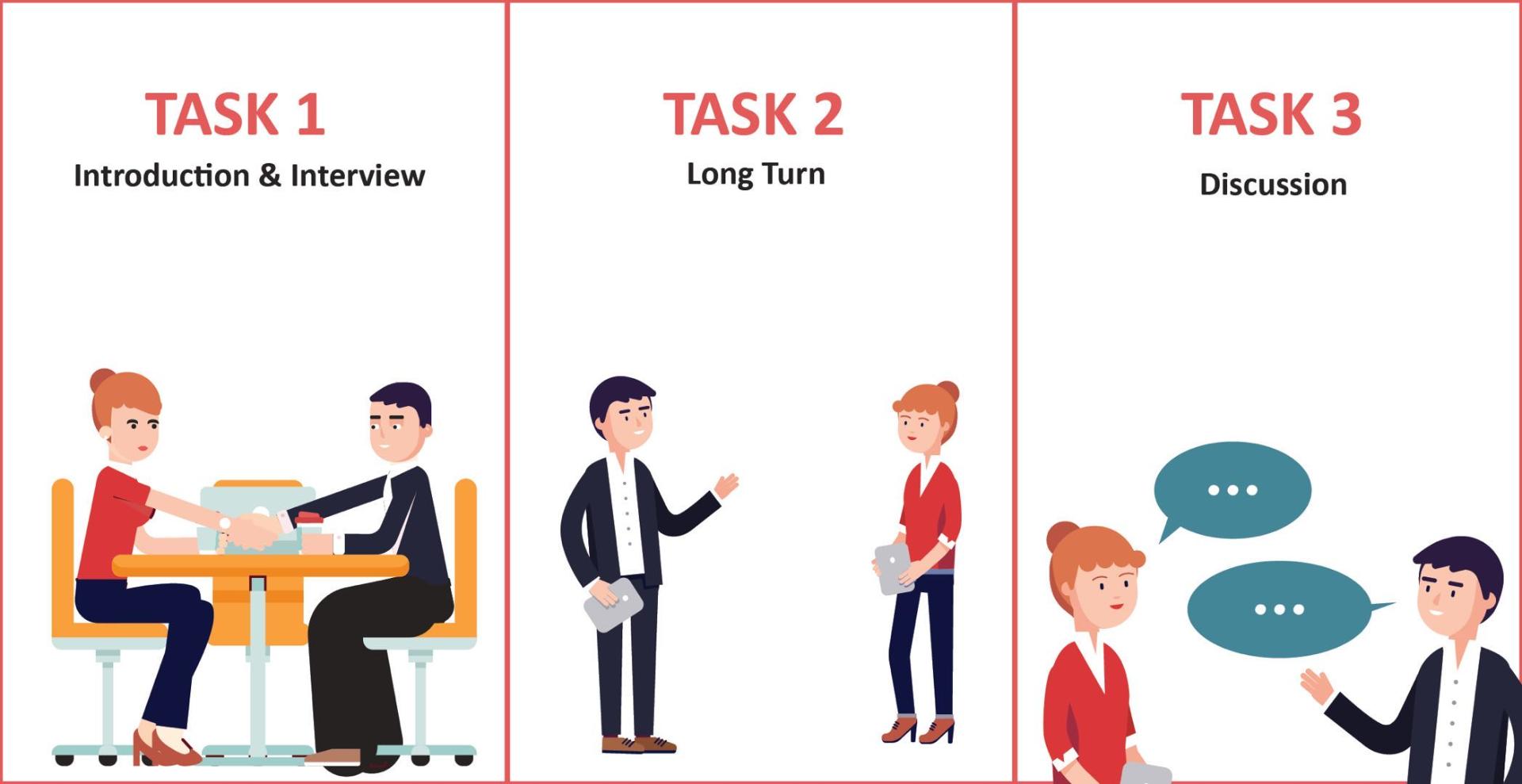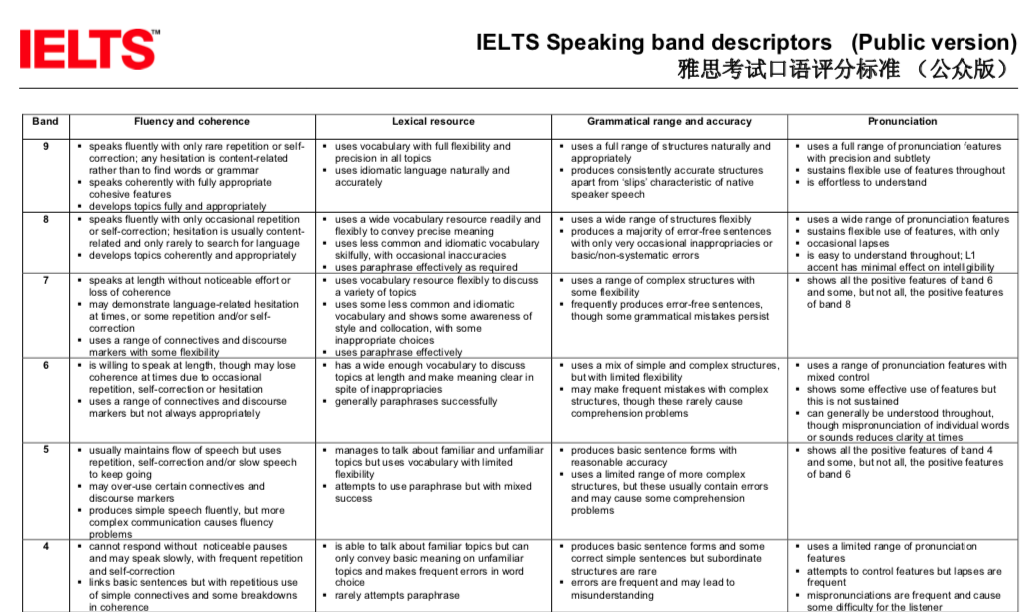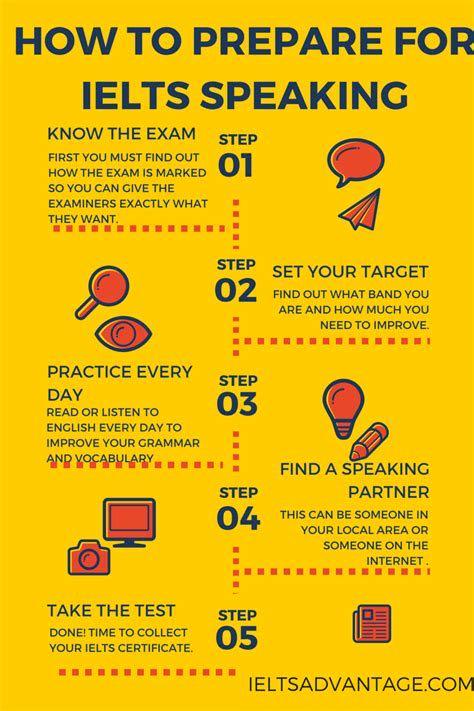
According to the official data released by IELTS, the average oral score of Chinese IELTS students in 2 was 016.5 points, and the average score in 28 improved 2.017 points. As a productive skill discipline, oral language must take a lot of time and energy to achieve a qualitative change in marks. So next, Meilun's IELTS teacher will provide you with some dry goods to review IELTS speaking, please read carefully and take notes!
Step1: Make the most of the speaking grading standard IELTS Speaking band descriptors (Public version)
I wonder if you have such a feeling when practicing speaking: after finally holding out a paragraph for enough time, you feel that your words are messy, but you don't know how to modify and improve? Or sometimes when watching high-scoring oral videos, I don't know what is good, and sometimes I even feel that the level of other people's speech is unattainable and can only be deterred.
In fact, when preparing for the speaking test, the speaking grading criteria are very important references. Because in the real test process, each student's speaking score is strictly according to the grading standard, from Fluency & Coherence (fluency and coherence); Grammar (grammar); Lexical Resource (vocabulary) and Pronunciation (phonetics) are assessed in four dimensions. The speaking scoring standard has a detailed introduction to the different score bands of each dimension.
Here the teacher uses connectives to give you an example. Many students like to use the conjunction and and because to make connections between sentences when answering questions (some students even use these two connectives between two sentences that have no juxtaposition or causation), so in this case, your Fluency & Coherence score can only be on Band5 This dimension, because you have over-use certain connectives. If we want to improve the score of this dimension to Band6, we need to meet the following requirements: uses a range of connectives。 This means that students will begin to accumulate other connectives that indicate juxtaposition and causation, such as: as well as; as; due to; also; at the same time, etc., and use it flexibly in your spoken answers.
Step2: Familiarize yourself with and practice the topic content of the season's speaking question bank
When teachers give students IELTS mock tests or regular speaking training, they are often asked by classmates: "Teacher, find me a simple (familiar) topic." "Every time I hear this request, the teacher will be very confused, isn't the oral question bank already given to everyone? Why are there still unfamiliar topics?
Here, the teacher would like to remind all students that whenever you get the new season's speaking question bank, you should browse it once and filter out new questions and old questions. The old topics have already been prepared, so you only need to look through the previous notes for proper review.
When encountering a new topic, students should first ask themselves two questions: (1) Do I know anything about this topic? (2) Do I have a vocabulary for related topics?
These two questions will guide us well through the practice of speaking. For example, if you encounter the topic of perfume, many students may often feel a headache. Then the first step should be to check the relevant website (preferably in English) on the Internet to understand some perfume-related knowledge, such as: the meaning of giving perfume; Types of perfumes; famous perfume brands and so on; Secondly, you must start accumulating some topic vocabulary, such as: perfume counter; heady (intoxicating); fragrant (fragrant).

Step3: Speak more and practice more
If the first two steps are to let the students achieve the goal of having something to say, then the last step is of course to speak out. In the final analysis, if you want to improve your speaking level, you still need to speak more and practice more.
Many students often hope that a teacher can help them correct their speaking homework, otherwise they feel that their practice is meaningless. In fact, students can download an app on their mobile phones that can be recorded, record their answers every time they train, and then listen back. In the process of listening back, you can analyze your own connectives (connective words); sentence structure; paraphrase and its own pronunciation features. If you find yourself overusing a certain connective, you can mark it, and then write out the connective word that can be replaced and used for oral training again; If you find that the pronunciation of a word is not standard, you can record it and then check the dictionary or repeat the reading training according to the phonetic transcription; If you find that each sentence does not sound like a pitch fluctuation, you can mark the weak reading words in your manuscript for phonetic training.
Step4: Listen more, watch more news reports from foreign media, and accumulate authentic English expressions.
Recently, due to the globalization of the epidemic, teachers have noticed that many students are paying more attention to news reports than before, so you may wish to read more news reports from foreign traditional media such as the BBC and VOA. On the one hand, it can improve our listening level, on the other hand, students' vocabulary can also be improved, which can help us to express our opinions in more accurate words in the speaking test. For example, many students say very old and too simple when describing humble living conditions, while native speakers prefer to use the word primitive.
Step5: Use more English for classroom communication.
Students have been resuming classes online for more than a month since February 2, so the best opportunity to practice speaking is of course to communicate with your teacher in English in class. IELTS Speaking involves a variety of topics and subject knowledge, and if students are accustomed to thinking and answering questions and answers in English in their usual classrooms, they will invisibly accumulate enough topic vocabulary and related opinions.
In fact, no matter how difficult IELTS speaking is, there is a solution that can be dealt with, but it requires students to have tenacious perseverance and constantly polish their answers. I believe that all students can get real progress and results after experiencing this IELTS speaking review process.
If you want to experience the feeling of an IELTS computer-delivered test, you can register for the mock test through the IELTS official website: https://cdielts.gelielts.cn. In addition, the editor also comes with the official IELTS speaking "tips", please check, no thanks!
